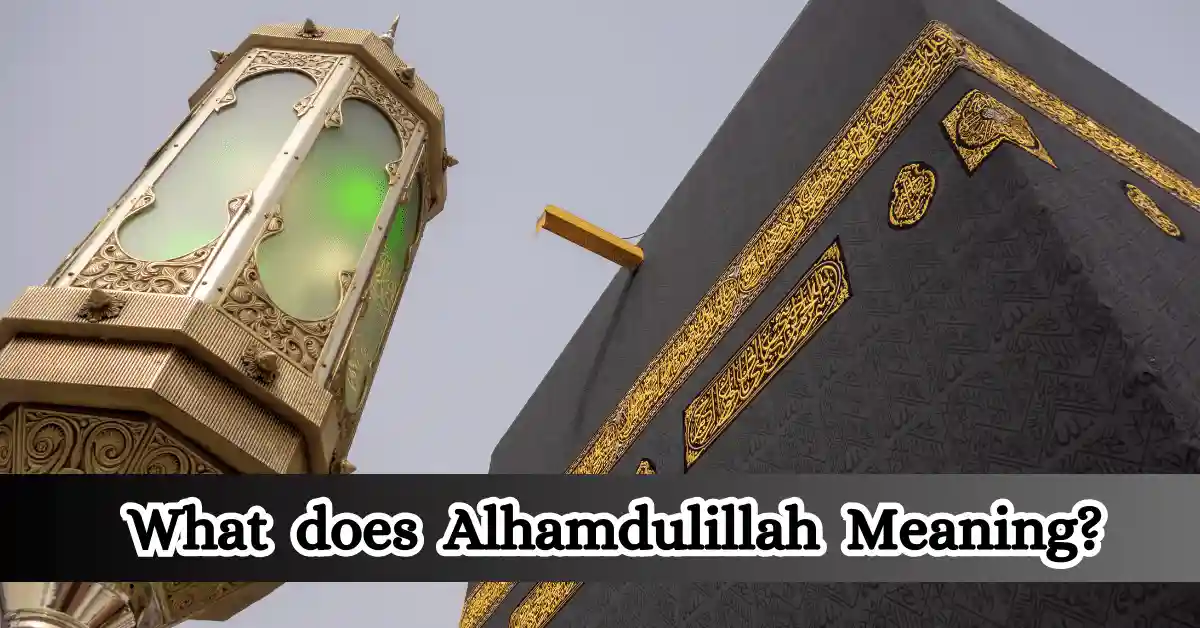The phrase “Alhamdulillah” is a powerful and fundamental expression in Islamic culture. It encapsulates gratitude, praise, and acknowledgment of Allah’s countless blessings. Here’s an introduction to the significance and usage of “Alhamdulillah.”
What does Alhamdulillah Meaning?
Alhamdulillah, Meaning in Arabic
“Alhamdulillah” (الْحَمْدُ لِلَّهِ) is an Arabic phrase frequently used by Muslims. It is an expression of gratitude and praise to Allah, meaning “All praise is due to Allah” or “All thanks are to Allah.” The term consists of three parts:
- Al (ال):
- The definite article in Arabic is equivalent to “the” in English.
- Hamd (حَمْدُ):
- Praise, gratitude, or thanks.
- Allah (لِلَّهِ):
- Allah is the Arabic name for God.
Translation
“All praise is due to Allah,” “All thanks are to Allah,” or “Praise be to Allah.”
Alhamdulillah Meaning in other languages
The phrase “Alhamdulillah” (الْحَمْدُ لِلَّهِ) holds a specific meaning in Arabic. While there may not be direct equivalents in other languages, the essence of gratitude and praise to a higher power can be expressed. Here are translations in several languages:
- English:
- “All praise is due to Allah.”
- “All thanks are to Allah.”
- “Praise be to Allah.”
- Urdu:
- “الحمد اللہ”
- “Sab tareef Allah ke liye hai.”
- Indonesian/Malay:
- “Segala puji bagi Allah.”
- “Semua puji bagi Allah.”
- French:
- “Louange à Allah.”
- “Toutes les louanges sont à Allah.”
- Spanish:
- “Toda alabanza es para Allah.”
- “Gracias sean dadas a Allah.”
- German:
- “Alle Lobpreis gebührt Allah.”
- “Dank sei Allah.”
- Turkish:
- “Tüm övgüler Allah’a aittir.”
- “Allah’a şükürler olsun.”
- Bengali:
- “আল্লাহর জন্য সব প্রশংসা।”
- “সকল ধন্যবাদ আল্লাহর জন্য।”
These translations aim to convey the meaning of expressing gratitude and praise to Allah. While the wording may differ, the sentiment of acknowledging and thanking a higher power is preserved across languages.
Usage
Muslims use “Alhamdulillah” to express gratitude and acknowledgment of Allah’s blessings, acknowledging that all good things come from Allah. It is said in various situations, whether in times of joy, after accomplishing a task, or even in challenging moments, as a way of affirming trust in Allah’s wisdom.
“Alhamdulillah” is used in various situations to express gratitude for the blessings and favors of Allah. It is commonly said:
- After sneezing.
- When expressing contentment or satisfaction.
- After overcoming a difficulty or challenge.
- In moments of joy, success, or achievement.
- As a general expression of thanks and acknowledgment of Allah’s mercy.
Cultural and Spiritual Significance
“Alhamdulillah” is not just a phrase but a fundamental aspect of Islamic culture and daily life. It reflects the Islamic understanding that all praise, thanks, and appreciation ultimately belong to Allah, the Creator and Sustainer of the universe.
- Gratitude: “Alhamdulillah” is a constant reminder for Muslims to express gratitude for all aspects of life and recognize that every blessing comes from Allah.
- Contentment: It is often used to express joy and satisfaction with Allah’s decree, fostering a positive and accepting outlook on life.
- Acknowledgment: The phrase emphasizes the belief that all goodness, success, and well-being are ultimately under Allah’s control.
In the Quran
The phrase “Alhamdulillah” is found in several places in the Quran, emphasizing the importance of expressing gratitude to Allah. One notable instance is in the opening chapter, Al-Fatiha (1:1-2), where Muslims recite it in every unit of their prayers (Salah).
Example Usage
- After a meal, a person might say, “Alhamdulillah,” to express gratitude for the food they have consumed.
- If someone asks, “How are you?” a person might respond with “Alhamdulillah” to express gratitude and contentment.
- Muslims use “Alhamdulillah” in daily interactions, whether in response to inquiries about well-being or as a general expression of gratitude.
- It is said during challenging moments, serving as a reminder to maintain patience and trust in Allah during difficulties.
- After achieving success or experiencing moments of joy, Muslims express gratitude with “Alhamdulillah.”
In summary, “Alhamdulillah” is a central expression in Islamic culture, symbolizing gratitude, acknowledgment of Allah’s blessings, and the understanding that all praise is rightfully directed to Allah.
Alhamdulillah in Hadith
The phrase “Alhamdulillah” is not explicitly mentioned in a specific hadith with those exact words, but the concept of praising and thanking Allah is emphasized in various hadiths. Hadiths are sayings, actions, or approvals of Prophet Muhammad (peace be upon him), and they often convey the essence of expressing gratitude and praising Allah. Here are some relevant hadiths:
- Gratitude for Blessings: Prophet Muhammad (peace be upon him) said: “He who does not thank people, he does not thank Allah.” (Ahmad, Tirmidhi)
- Praise for Allah’s Decree: Prophet Muhammad (peace be upon him) said: “How wonderful is the affair of the believer, for his affairs are all good, and this applies to no one but the believer. If something good happens to him, he gives thanks, and that is good for him; if something bad happens to him, he bears it with patience, and that is good for him.” (Muslim)
- Thanking Allah in All Circumstances: Prophet Muhammad (peace be upon him) said: “Amazing is the affair of the believer, certainly all of his affairs is good, and this is not for no one except the believer. If something of good/happiness befalls him, he is grateful and that is good for him. If something of harm befalls him, he is patient, and that is good for him.” (Muslim)
While these hadiths may not contain the exact phrase “Alhamdulillah,” they convey the importance of gratitude, patience, and acknowledgment of Allah’s role in both positive and challenging situations. Muslims are encouraged to express thanks and praise to Allah for His blessings and to remain patient and steadfast during difficulties.
